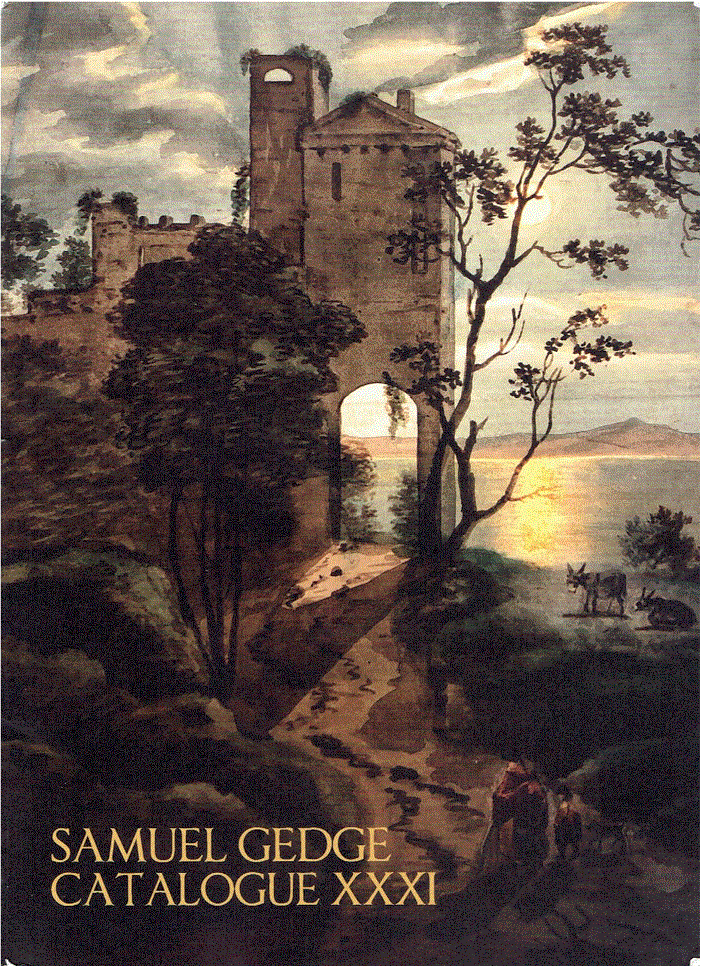Catalogue XXXI from Samuel Gedge Ltd.
- by Michael Stillman

Catalogue XXXI from Samuel Gedge Ltd.
Samuel Gedge Ltd. has issued their Catalogue XXXI. Roman numerals are appropriate considering this unusual mix of items has one thing in common – it's old. The material is primarily British except there is a large selection of novels, often obscure, originally written in English but in French and German translations. These tend to be quite rare. There are numerous manuscripts and other documents, some artwork, a few items that are not books or anything on paper, such as a large wallet that likely held business papers a couple of centuries ago, and an anti-slavery medal. These are a few of the items to be found in this latest selection.
We begin with a book of advice for mothers on raising their children. It is 200 years old, but most of the issues are surprisingly similar to what people face today. We still need answers. Among the topics are the importance of sleep, the advantages of breast feeding and what to feed once the baby is weaned, the importance of pure air and exercise (even more important today), walking, attention to dress, injurious consequences of clothing that is either too warm or two cold, importance of attention to the feet, overindulgence of food, the importance of bathing, washing, and cleanliness. There is also a section on mischief resulting from tight dressing, which might be a little baffling until seeing someone in very tight clothing. That could lead to mischief. The title is Letters to a Mother on the Management of Infants and Children, Embracing the Important Subjects of Nursing, Food, Clothing, Exercise, Bathing, &c. It was published in 1817. Item 24. Priced at £1,250 (British pounds or approximately $1,692 in U.S. dollars).
This author is generally considered the first American woman writer of Gothic novels. She is also known as the first novelist from Maine. She actually had a head start there. Her first four novels were published while Maine was part of Massachusetts. She wrote them anonymously as “A Lady from Massachusetts,” and not until her fifth and final novel used the sobriquet “A Lady from Maine.” While known as a first Gothic novelist, only her first book really fit that description. Her name was Sarah "Sally" Sayward Barrell Keating Wood, though most knew her as Sally or Madame Wood. In keeping with what we find in Gedge catalogues, item 62 is a copy of her first, and the Gothic novel, in the first French edition. The title is Le Baron Illuminé, published in 1804, a translation of her 1800 book, Julia and the Illuminated Baron. All but her final novel were published in a short window from 1800-1804 though she lived 95 years, from 1759-1855. Though married twice, her marriages lasted only five and seven years, with long stretches of widowhood, which was when she did her writing. Item 62. £3,500 (US $4,738).
Speaking of illuminated Gothic, this next item is a transparency, circa 1815, of a nocturnal monastic funeral possession in a medieval chapel. You don't get much more Goth than that. It is an eerie sight. Transparencies were images meant to be back lighted. The back lighting illuminates the moon and a mysteriously glowing crypt. The funeral procession carries a shrouded corpse to be placed in the crypt. Item 63. £1,250 (US $1,692).
Item 19 consists of the copper plates for two trade cards. You can print more of them so long as you don't call them “contemporary.” One is for William Monk Horse Slaughterer circa 1815, the other for William Barber Successor to the Late William Monk Licensed Horse Slaughterer. I didn't even know there was such a profession, but apparently this is more common in England. They say they were slaughtering 50-60 horses a week, which I guess is something to be proud of. They call themselves a “manufacturer of genuine horse fat,” which had a variety of uses back then. It all sounds strange to Americans who prized horses so much for transportation they would kill someone for horse theft. They point out that “the description & marks of every horse brought to this establishment are carefully entered in a book, & when improperly obtained every facility given to detect the offender...” Horse theft must have been an issue in England too. Item 19. £950 (US $1,286).
This is a playbill for Theatre, Leeds, for July 7, 1815, a Benefit of Mr. Mansel. Two plays were to be performed, First, West Indian, followed by a couple of songs, and then the more interesting The Forest of Bondy; Or, The Dog of Montargis. The title role was performed by The original Dog, Dragon. The plot was based on a 14th century French legend. The dog's master is killed in the forest of Bondy. The wise dog not only informs authorities of his master's death, but saves an innocent person accused of the murder. Gedge tells us that this play was noteworthy as it was “the first instance of a trained dog performing a significant role on stage.” Give that dog a hand. Item 61. £250 (US $338).
Samuel Gedge Ltd. Rare Books may be reached at +44 (0)1263 768 471 or rarebooks@samuelgedge.com. Their website is www.samuelgedge.com.